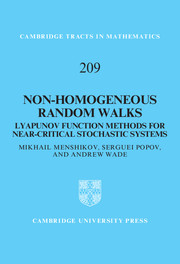Preface
Published online by Cambridge University Press: 02 February 2017
Summary
What Is This Book About?
This book has two main goals:
• to give an up-to-date exposition of the ‘semimartingale’ or ‘Lyapunov function’ approach to the analysis of stochastic processes;
• to present applications of the methodology to fundamental models (classical and modern) in probability theory and related fields.
Our expository bridge between these dual aims, between methods and models, is the d-dimensional non-homogeneous random walk, which as a model is simple to describe, closely resembling the classical homogeneous random walk, but which displays many interesting and subtle phenomena alien to the classical model. Non-homogeneous random walks cannot be studied by the techniques generally used for homogeneous random walks: new methods (and, just as importantly, new intuitions) are required.
Semimartingale and Lyapunov function ideas lead to a unified and powerful methodology in this context. As well as non-homogeneous random walks, we present applications of the methods to several other models from modern probability theory; while any of the models that we discuss can be studied by several probabilistic techniques, we believe that only the Lyapunov function method has something to say about all of them.
We emphasize that semimartingale methods are ‘robust’ in the sense that the underlying stochastic process need not satisfy simplifying assumptions such as the Markov property, reversibility, or time homogeneity, for instance, and the state space of the process need not be countable. In such a general setting, the semimartingale approach has few rivals. In particular, the methods presented work for non-reversible Markov chains. A general feeling is that, if a Markov chain is reversible, then things can be done in many possible ways: there are methods from electrical networks, spectral calculations, harmonic analysis, etc. On the other hand, the non-reversible case is usually much harder. Similarly, the Markovian setting is not essential to the methods. In the semimartingale approach, the Markov property is a side issue and non-Markovian processes can be treated equally well.
- Type
- Chapter
- Information
- Non-homogeneous Random WalksLyapunov Function Methods for Near-Critical Stochastic Systems, pp. vii - xivPublisher: Cambridge University PressPrint publication year: 2016



